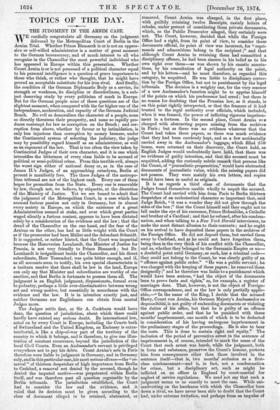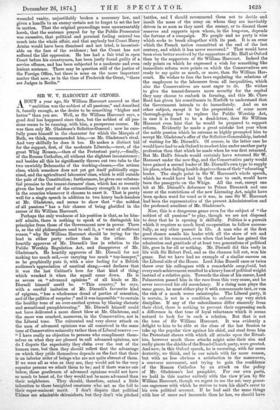TOPICS OF THE DAY.
THE JUDGMENT IN THE ARNIM CASE.
WE cordially congratulate all Germany on the judgment delivered by the Metropolitan Court of Berlin in the Arnim Trial. Whether Prince Bismarck is or is not an oppres- sive or self-willed administrator is a matter of great moment to the German bureaucracy, and of much interest to all who recognise in the Chancellor the most powerful individual who has appeared in Europe within this generation. Whether Count Arnim is or is not possessed of a political character equal to his personal intelligence is a question of grave importance to those who think, or rather who thought, that he might have proved an acceptable substitute for his iron rival. And finally, the condition of the German Diplomatic Body as a service, its strength or weakness, its discipline or disorderliness, is a sub- ject deserving study by every politician of mark in Europe. But for the German people none of these questions are of the slightest moment, when compared with the far higher one of the independence, moderation, and capacity of the German Judicial Bench. No evil so demoralises the character of a people, none so directly threatens their prosperity, and none so rapidly pro- duces contempt for law as corruption on the Bench ; and cor- ruption from above, whether by favour or by intimidation, is only less injurious than corruption by money because, under the Continental system of selecting the judiciary, the judge may by possibility regard himself as an administrator, as well as an exponent of the law. That is too often the view taken by Continental Judges of their own character, and it is one which intensifies the bitterness of every class liable to be accused of political or semi-political crime. From this terrible evil, always the worst sign either of national decay or, as in the case of James IL's Judges, of an approaching cataclysm, Berlin at present is manifestly free. The three Judges of the metropo- litan tribunal are not of the highest rank. Every one of them hopes for promotion from the State. Every one is removable by law, though not, we believe, by etiquette, at the discretion of the Ministry of Justice. Yet we are bound to admit that the judgment of the Metropolitan Court, in a case which has aroused furious passion not only in Germany, but in almost every society in Europe, on which the existence of a great Administration seemed at stake, and over which great parties waged silently a furious contest, appears to have been dictated solely by a consideration of the evidence and the law ; that the dread of the Chancellor on the one hand, and the fear of the Arnims on the other, has had as little weight with the Court as if the prosecutor had been Muller and the defendant Schmidt. It is suggested, or,rather hinted, that the Court was impartial because the Hanoverian Leonhardt, the Minister of Justice for Prussia, is not very friendly to Prince Bismarck ; but Dr. Leonhardt is insignificant beside the Chancellor, and his direct subordinate, Herr Tessendorf, was quite bitter enough, and if, as all accounts seem to testify, his own special characteristic is a taciturn resolve that there shall be law in the land, Europe can only say that Minister and subordinates are worthy of one another, and that Berlin is fortunate to possess them all. The judgment is an English judgment, dispassionate, formal even to pedantry, perhaps a little over-discriminative between wrong act and wrong motive, but essentially in accordance with the evidence and the law. It is in intention exactly just, and neither Germans nor Englishmen can obtain from mortal Judges more.
The Judges settle first, as Sir A. Cockburn would have done, the question of jurisdiction, about which there could hardly have existed any serious doubt. By international law, acted on by every Court in Europe, including the Courts both of Switzerland and the United Kingdom, an Embassy is extra- territorial, is like a ship-of-war part of the territory of the country to which it belongs, and is therefore, to give one illus- tration of constant recurrence, beyond the jurisdiction of the local Civil Courts. Even an Ambassador's servant is privileged everywhere not to pay his debts. Count Arnim's acts in Paris therefore were liable to judgment in Germany, and in Germany only, and in this particular case, his most serious offence—the " re- moval " of thirteen despatches of high importance from Berlin to Carlsbad, a removal not denied by the accused, though he denied the imputed motive—was perpetrated within Berlin itself, and was therefore past all question cognisable by the Berlin tribunals. The jurisdiction established, the Court had to consider the law and the evidence, and it ruled that its decision must be given according to the class of document alleged to be retained, abstracted, or
removed. Count Arnim was charged, in the first place,. with guiltily retaining twelve Rescripts, mainly letters of rebuke, under pretext of considering them private documents, which, as the Public Prosecutor alleged, they certainly were not. The Court, however, decided that while the Foreign Office had a right, from its point of view, to consider these documents official, its point of view was incorrect, for "repri- mands and admonitions belong to the recipient ;" and that although Count Arnim in retaining them had committed a- disciplinary offence, he had been sincere in his belief as to his own right over them—as was shown by his caustic annota- tions, by his consultation of legal authority on the point, and by his letters—and he must therefore, as regarded this category, be acquitted. He was liable to disciplinary correc- tion by the Foreign Office, but not to punishment by the legal tribunals. The decision is a weighty one, for the very essence of a new Ambassador's function might be to apprise himself of the points on which his predecessor had erred ; but there is no reason for doubting that the Prussian law, as it stands, is on this point rightly interpreted, or that the framers of it hid trusted to the regal authority over officials, which included, when it was framed, the power of inflicting rigorous imprison- ment in a fortress. In the second place, Count _Arnim wrs charged with abstracting papers missing from the archives- in Paris ; but as there was no evidence whatever that the- Count had taken these papers, as there was much evidence that they had been carelessly kept, and as a few accidentally carried away in the Ambassador's luggage, which filled 250+ boxes, were returned on their discovery, the Court held, as English Judges would undoubtedly have held, that there was no evidence of guilty intention, and that the accused must be- acquitted, adding the curiously subtle remark that persons like the Count, of "journalistic propensities," would have abstracted documents of journalistic value, which the missing papers did not possess. They were mainly his own letters, and copies would have been as useful as originals.
It is as regards a third class of documents that the. Judges found themselves unable wholly to acquit the accused. The Count had carried with him from Paris to Berlin thirteen despatches of an ecclesiastical character so important that, said Judge Reich, "it was a wonder they did not glow through the sides of the box ;" that the Count himself said they ought not to, fall under the eye of his successor, Prince Hohenlohe, a Catholic. and brother of a Cardinal; and that he refused, after his condem- nation, and when talking to a New York Herald interviewer, to, make the most distant allusion to their contents ; and he ought on his arrival to have deposited these papers in the archives of the Foreign Office. He did not deposit them, but carried them away to Carlsbad, and as he could not have forgotten them,. being then in the very thick of his conflict with the Chancellor, and as, whether they belonged to the Germanic Empire or no— a doubtful point until Germany, as such, has a criminal code— they could not belong to the Count, he was clearly guilty of an. "offence against public order." "He was a public servant; he was charged with the keeping of these papers ; he removed them_ designedly;" and he therefore was liable to a punishment which would have been serious, "had the object of the documents been to prove facts and rights," as, for example, a register of marriages does. That, however, is not the object of Foreign- Office correspondence, and as the law is only partially applic- able,—" In the name of the King, I decide that the accused Harry, Count von Arnim, his German Majesty's Ambassador en. desponsibilitd, is not guilty of embezzling documents or violating the duties of his office, but that he is guilty of an offence against public order, and that he be punished with three- months' imprisonment, one month of which is to be deducted in consideration of his having undergone imprisonment in the preliminary stages of the proceedings. He is also to bear the costs. This is done to sustain right and equity." The inclusion of the period of preventive arrest in the sentence of imprisonment is, of course, intended to mark the sense of the Court that such arrest was harsh, while the judgment, both in form and substance, preserves the Count's honour, protects him from consequences other than those involved in the sentence itself—that is, two months' seclusion as a first- class misdemeanant—and is, in fact, not a condemnation for crime, but a disciplinary act, such as might be inflicted on an officer in England by court-martial for neglect of service regulations. We need not say that such a judgment seems to us exactly to meet the case. While ani- madverting on the harshness with which the Chancellor bore down a rival, we have never been able to doubt that the Count had, under extreme irritation, and perhaps from an impulse of ti wounded vanity, unjustifiably broken a necessary law, and given a handle to an enemy certain not to forget to set the law in motion. That the original proceedings were unwarrantably harsh, that the sentence prayed for by the Public prosecutor was excessive, that political and personal feeling entered too much into the whole affair, and that anybody but Count Harry Arnim would have been dismissed and not tried, is incontest- able on the face of the evidence ; but the Count has not suffered the list oppression. He has had a fair trial in open Court before his countrymen, has been justly found. guilty of a service offence, and has been subjected to a moderate and even lenient sentence. There may be question still of the justice of the Foreign Office, but there is none on the more important matter that now, as in the time of Frederick the Great, "there are Judges in Berlin."



































 Previous page
Previous page